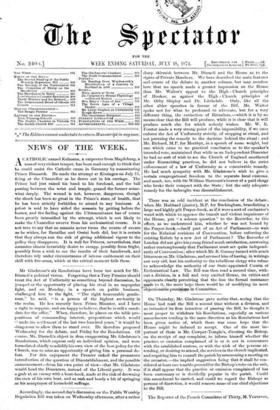On Thursday, Mr. Gladstone gave notice that, seeing that the
House had read' the Bill a second time without a division, and so intimtited its firm intention of passing the Bill, he thought it most proper to withdraw his Resolutions, especially as various amendments tending in the same direction as his Resolutions had been given notice of, which there was some hope that the House might be induced to accept. One of the most im- portant of thee is Mr. Cowper-Temple's, directing the Bishop, on the receipt of any complaint, to inform himself whether the practice or omission complained of is or is not in consonance with the established custom, or with the wish of the persons at- tending, or desiring to attend, the services in the church implicated, and requiring him to consult the parish by summoning a meeting on the occasion,—the implied suggestion being that it shall be con- sidered at least one tenable ground for the Bishop's veto on the suit, if it shall appear that the practice or omission complained of has been customary or is decidedly popular in the parish. Could this amendment be carried, and could we regard the Bishops as persons of discretion, it would remove some of our chief objections to the Bill.


































